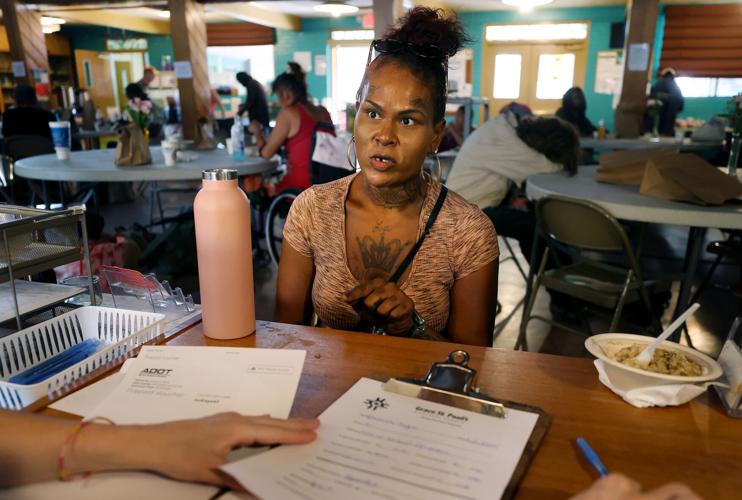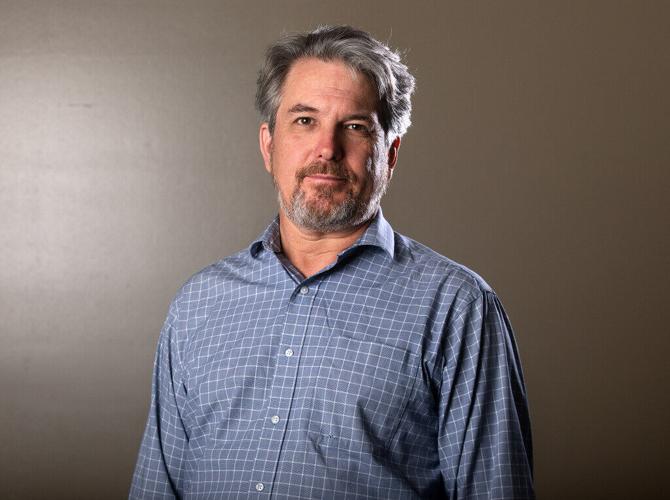The dynamic is becoming familiar in Tucson.
Street people start hanging out in a neighborhood, maybe camping or using drugs near a wash or in a park. Most of the neighborhoodŌĆÖs residents tolerate them as unhoused and needy. Some may get angry, but others may even help them out.
Then something happens, or an accumulation of things, and the long-term residents go from tolerant to intolerant. They may take matters into their own hands, by cutting down trees or taking peopleŌĆÖs belongings; they may lash out at public meetings or on private communications with officials; they may even file formal complaints against the city, or sue.

├█╠ęė░Ž±AV columnist Tim Steller
The pattern has been repeating, with variations, across Tucson, a city where, over a few years, almost every neighborhood has been affected by the proliferation of people living on our streets, in our parks and washes.
People are also reading…
One of the latest neighborhoods to go through this process: in Midtown. There, the three-times-a-week provision of services to needy people, by Grace St. PaulŌĆÖs Episcopal Church, has turned into a flashpoint. The next step is likely to be a lawsuit.
, 2331 E Adams St., has been offering services for the needy in the comfortable, university-area neighborhood for more than 25 years. Over the years, to also offering showers, services such as ID acquisition, and a cafe.
There have been a few complaints over the years, but more tolerance and even cooperation from the neighborhood. Since the pandemic, thatŌĆÖs changed.
ŌĆ£In the last 2┬Į years, our numbers have increased exponentially,ŌĆØ the acknowledged. ŌĆ£TheyŌĆÖve more than doubled.ŌĆØ
ŌĆ£ItŌĆÖs caused some greater pressure in the neighborhood, and there are some people who are very, very upset about that.ŌĆØ
ŌĆśIt didnŌĆÖt cross the lineŌĆÖ
One of them is Olga Yiparaki, who lives near the church and could be a plaintiff if a lawsuit materializes.
ŌĆ£It wasnŌĆÖt one particular point where it went from zero to 100,ŌĆØ she told me. ŌĆ£When I first moved to the neighborhood many years ago, there was always some activity, but for me personally and for most people in the neighborhood, it didnŌĆÖt cross the line.ŌĆØ
Since the pandemic, though, the increased numbers havenŌĆÖt just meant more people getting a sandwich or a shower. She told me sheŌĆÖs found drug paraphernalia, including needles, in her front yard.
ŌĆ£ThereŌĆÖs an empty lot that became a place for encampments. With that came all kinds of things, including trash, human excrement, needles and fires that got pretty dangerous at times,ŌĆØ she said.
In addition, she said, ŌĆ£A lot of neighbors including myself have gotten threats from folks that we believe are selling drugs in the area.ŌĆØ

Michelle Trujillo takes advantage of the social services offered during JosephŌĆÖs Pantry at Grace St. PaulŌĆÖs Episcopal Church. Trujillo received a voucher for a state-issued identification card.
In September last year, after a neighborhood meeting about the issues, residents and church representatives put together a working group to try to resolve differences.
ŌĆ£It was a very good-faith effort to try to reach a solution that worked for everybody,ŌĆØ Yiparaki said. ŌĆ£In the end it amounted to a great big nothing.ŌĆØ
That feeling is why now another neighbor, Alex Winkelman, is preparing to file suit against the church. Winkelman, it turns out, doesnŌĆÖt just live and work in the neighborhood, but also represented Tucson in an appeals case against the city┬Āby residents of the Hedrick Acres neighborhood over similar issues.
ŌĆ£We are considering it (a lawsuit) depending on whether we get a response to the last letter I sent the church,ŌĆØ he said.
ŌĆśDo it somewhere elseŌĆÖ
Church representatives feel theyŌĆÖve been accommodating. They do regular trash pickups, for example, something I saw at midday Friday as men circled the church area with pickers and bags, though there was little litter in sight.
But they feel theyŌĆÖre being asked to practically abandon their ministry to the poor. Indeed, one of the main proposals of neighbors negotiating with Grace St. PaulŌĆÖs was that the church hand over the operation to an outside group, such as Primavera Foundation, and move it somewhere else.

After receiving a sack lunch and breakfast, people sit inside JosephŌĆÖs Pantry at Grace St. Paul's Episcopal Church, 2331 E Adams St.
ŌĆ£ŌĆÖJust move it out of our neighborhood, do it somewhere else, and weŌĆÖll be happyŌĆÖ ŌĆö thatŌĆÖs what people kept coming back to,ŌĆØ Keplinger said.
You can see why the church would reject that. Still, Keplinger acknowledges the church has not been as strict as it could be. They make restrooms available 24 hours a day, for example.
In addition, ŌĆ£We have signs that say people are supposed to disperse after 2 pm,ŌĆØ Keplinger said. ŌĆ£ItŌĆÖs also true that when itŌĆÖs 110 out and people can hang out under the breezeway, weŌĆÖll let them.ŌĆØ
Resident Jim Malusa is both treasurer of the neighborhood association and a volunteer at Grace St. PaulŌĆÖs programs. He told me, ŌĆ£my sympathies lie on both sides.ŌĆØ
But he has noticed that the church doesnŌĆÖt move people out when itŌĆÖs time to leave, and has not acted forcefully enough to ban some troublemakers who show up. Those could end up putting the whole ministry at risk, Malusa said.
ŌĆ£ItŌĆÖs a shame because itŌĆÖs a great program.ŌĆØ
Lack of response
This feeling of not being listened to is something youŌĆÖll often find where these conflicts crop up. It was also a trigger in , where Adrian Wurr is co-chair of the neighborhood association and sued the city over allowing people to do drugs, camp, make fires and otherwise cause a nuisance in the Navajo Wash.
ŌĆ£One over-arching issue that can account for many of our complaints is simply the lack of response by the city to our concerns,ŌĆØ Wurr said by email Friday.
Wurr said he began to question whether city administration would ever clean up the camps in the wash near his home around 2022, which was the year the city established its homeless encampment protocol. Under that system, abandoned camps and those causing public safety and health concerns are to be cleared out, but those not posing such dangers are left.
ŌĆ£We wrote dozens of letters to the Ward 3 office to document our concerns; few received responses and none produced any change in the situation,ŌĆØ Wurr wrote.
Frustration led some neighbors to hire a crew that cut down trees in the wash, under which people hung out. It was a bad move, in my opinion, in a city bereft of trees, but a clear expression of frustration.
Wurr and two other neighbors sued in 2023. A Pima County Superior judge ruled against them last year, but an Appeals Court panel ruled in favor of the neighbors in May, finding the city liable for allowing a public nuisance in the wash. The city has appealed to the Arizona Supreme Court.
Neighbors not consulted
Now itŌĆÖs happening in Sugar Hill. That Tucson neighborhood had been having typical problems related to camps and drug sales, but city officials helped clean them up in recent years, said Jack Anderson Jr., president of the neighborhood association.
ThatŌĆÖs why it was such a shock and disappointment to some residents when the city announced it is placing the new STAR Village managed camp for 25 women on the north edge of the neighborhood, along East Grant Road.
ŌĆ£It took a lot of work to get to where we are in this neighborhood,ŌĆØ Anderson said.
Now, I actually think the STAR Village camp is an idea worth trying and will not be the problem that critics fear. Much of the outside opposition has been ideologically driven, over the whole idea of the city sanctioning camps of any sort, which I think is short-sighted. I hope STAR Village goes smoothly and changes minds after its scheduled opening this week.
But the neighbors were not consulted before the August announcement of the plan. And thatŌĆÖs a main reason why you heard all manner of protests howled at city officials during a Sept. 18 community meeting on the project. ItŌĆÖs that feeling of powerlessness. Granted itŌĆÖs not as big a sense of powerlessness as homeless or addicted people feel, but a valid feeling nonetheless.
ŌĆ£Pretty much the biggest issue was not being part of the process,ŌĆØ Anderson said. ŌĆ£We werenŌĆÖt told about this until afterward.ŌĆØ
In a city fed up with these issues, feeling cut out like that, or dismissed, pushes people over the edge.

VIEW: To read more of the latest by Tim Steller, point your smartphone camera at the QR code, then tap the link. ’┐╝
Contact columnist Tim Steller at tsteller@tucson.com or 520-807-7789. On Bluesky: @timsteller.bsky.social














